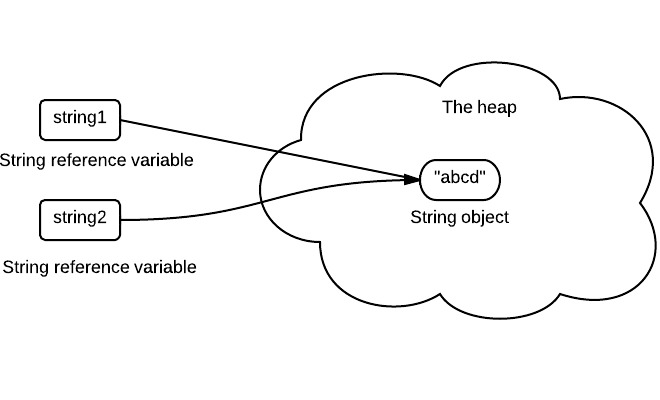Why Are Strings Immutable in Java? Recognizing the Core Principles
Why Are Strings Immutable in Java? Recognizing the Core Principles
Blog Article
What Is Immutable Strings and How It Functions
In the realm of programs, recognizing the idea of immutable strings is critical for producing durable and secure applications. Immutable strings refer to strings that can not be changed after they are created, ensuring information stability and predictability within the code.
The Fundamentals of Immutable Strings
Immutable strings, as a fundamental concept in programs, are character sequences that can not be changed as soon as they are produced. This indicates that when a string is designated a value, that worth can not be altered. In languages like Python and Java, strings are immutable items, causing various implications in terms of memory monitoring and information stability.
One of the crucial benefits of immutable strings is that they offer a complacency in information control. Because the web content of an immutable string can not be modified, it makes sure that the original data continues to be intact, minimizing the danger of unexpected modifications throughout program execution (Why are strings immutable in Java?). This building likewise streamlines debugging procedures, as programmers can trust that as soon as a string is defined, its value will certainly not be accidentally modified
Furthermore, unalterable strings assist in effective memory usage. When a new string is created based on an existing one, as opposed to customizing the initial string, the brand-new worth is saved separately. This approach enhances efficiency by decreasing memory fragmentation and simplifying memory appropriation procedures. On the whole, understanding the basics of unalterable strings is important for grasping programming ideas and enhancing code efficiency.
Advantages of Unalterable Strings
Building upon the safety and security and performance advantages of immutable strings, their benefits reach enhancing code dependability and streamlining simultaneous programs tasks. By being immutable, strings can not be modified after creation, which removes the danger of unintentional adjustments in the information they save. This intrinsic immutability ensures that as soon as a string is created, its worth stays constant throughout the program's execution, reducing the opportunities of pests brought on by unanticipated changes.
Additionally, unalterable strings add to code reliability by making it simpler to reason about the state of a program. Given that strings can not be altered, designers can rely on that a string will certainly always hold the same worth, streamlining debugging and maintenance initiatives. This predictability brings about more stable and reputable codebases.

Application in Programs Languages
Within different programs languages, the unification of unalterable strings is a fundamental element that influences just how information is dealt with and controlled within code frameworks. The implementation of unalterable strings varies across different programs languages, with each language using its very own devices to sustain this concept.

On the other hand, languages like C and C++ do not have built-in support for unalterable strings. Programmers in these languages need to by hand execute immutability by enforcing rules within their code to avoid direct alterations to string things.
Best Practices for Dealing With Immutable Strings
When taking care of unalterable strings in programs languages like Java and Python, adhering to ideal techniques makes try this site sure safe and efficient information adjustment. Among the vital ideal techniques is to utilize StringBuilder or StringBuffer instead of straight controling strings, specifically when managing extensive concatenation procedures. These classes give mutable options for string manipulation, assisting to avoid unnecessary memory allocations and enhancing performance.
Additionally, when functioning with sensitive data such as passwords or API tricks, it is crucial to stay clear of saving them as plain message in unalterable strings. Utilizing secure storage space devices like char selections or specialized collections for dealing with sensitive info helps reduce safety and security threats linked with unalterable strings.
Real-world Applications and Instances
Discovering functional executions of immutable strings in Resources different markets discloses their considerable effect on information honesty and system reliability. In the healthcare sector, unalterable strings play a vital duty in making certain the safety and security and discretion of patient data. By protecting against unapproved modifications to delicate details such as clinical documents and prescriptions, unalterable strings assist preserve conformity with stringent privacy laws like HIPAA.
Financial organizations also gain from the unalterable nature of strings to improve the safety of client information and deal records. Unalterable strings aid avoid scams and unapproved modifications to financial info, giving a durable defense versus cyber threats and making certain the depend on and confidence of clients.

Conclusion
Ideal practices for functioning with unalterable strings consist of staying clear of direct alterations and making use of techniques that return brand-new string things. Real-world applications of immutable strings consist of information file encryption, caching, and string adjustment tasks.
Immutable he has a good point strings refer to strings that can not be modified after they are developed, ensuring information stability and predictability within the code. When a new string is created based on an existing one, rather than customizing the original string, the brand-new value is kept separately.In languages like Java and Python, strings are unalterable by default, implying that as soon as a string things is created, its worth can not be transformed - Why are strings immutable in Java?. Finest techniques for functioning with unalterable strings include preventing direct adjustments and making use of approaches that return brand-new string things. Real-world applications of unalterable strings include data security, caching, and string control tasks
Report this page